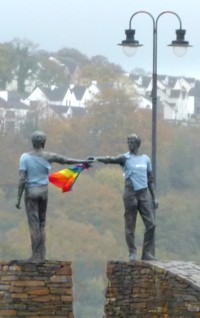Derry (Londonderry)
County Derry, like Sligo, was first settled by Neolithic farmers and experienced successive waves of invasion through to the Vikings and then the Normans.
The last great invasion was prompted by religious schism when a 'plantation' of Scottish and English Protestants was established by James I and the city of Londonderry was founded and later fortified. Unlike many of the cities to the south, Londonderry was less badly affected by the potato famines, leading to an influx of Roman Catholics to what had previously been a predominantly Protestant city.
The Protestants reacted by denying the newcomers proper democratic representation and many were settled in sub-standard housing on land that was reclaimed from an arm of the River Foyle called the Bogside. In 1922 (see the history above...) Ireland was partitioned and Northern Ireland became a separate country, like Scotland, and a part of the United Kingdom. From the 1960's until the turn of the century Roman Catholics, outnumbered Protestants by three to one in Londonderry and they struggled to gain social equity and equal representation during a period known as 'The Troubles' (again see the history above)
Today the legal name of the City remains Londonderry but the democratically elected city council is the 'Derry City Council' and it is now universally referred to as Derry.
One of the legacies of the Protestant plantation's struggle to survive in a hostile countryside is one of the youngest, finest and best preserved walled cities in Europe.
We walked right around it, admiring some fine buildings within and without. At the top corner stands the Church of Ireland Cathedral that more than once needed to be defended. Along the wall a little way, overlooking the Bogside, are the ruins of the 96 foot high pillar, once topped by a nine foot tall statue of Bishop Designate George Walker, hero of the Siege of Londonderry (1689). Walker was a supporter of William of Orange against the deposed Catholic James II of England and VII of Scotland. His column was perceived to be a symbol of Protestant overlordship. It was bombed by the IRA in 1973. Unlike the Pikeman of Tralee (see Tralee above...), it has not been replaced with a better one.
Meanwhile, other bombed buildings have been repaired or replaced, mostly with better ones, and the city is again thriving. Yet the Protestant activists are concerned. Already in the minority, their numbers are dwindling and their explanation is that Protestants are being forced out, particularly from the west side. They have erected various billboards to this effect. For their part the Catholics have resorted to wall art to tell their side of 'The Troubles'.
As in the Republic both Christian sects are on the decline. The number of people reporting no religion has increased by over 30% in the past ten years and we can but hope that the growing numbers of secular Irish will continue to keep the ideologues under control, so that everyone can continue to live in relative harmony.
In 2011 Peace Bridge across the Foyle was opened in an effort to improve relations between the predominantly unionist 'Waterside' and predominantly nationalist 'Cityside' and a bronze sculpture called 'Hands Across the Divide' was erected depicting the two sides shaking hands. When we were there it was festooned with a rainbow banner, making it seem that the two figures were shaking hands preliminary to more intimate congress, perhaps across the nearby border with the Rainbow Republic.
In the meantime, if you want to visit a fine walled city in almost original condition and enjoy some good food and a Guinness or Cider or two, among apparently healthy, happy and wise citizens, Derry has a lot to recommend it.
See the Ireland Album - Click Here...

